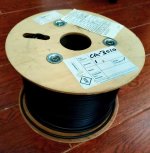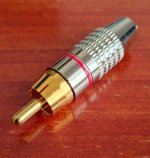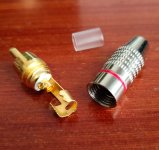I prefer using pure copper to make cables. I need eight RCA cables where each cable will be 6 feet long. I am thinking of making the cables myself because I think it will be fun. Bought decent solderless RCA connectors and I have a whole roll of RG58C/U coaxial cable which I never used.
Just to clarify, I need the 8 RCA cables specifically for audio only.
A quick google search revealed the following about the cable I have:-
RG58C/U is a 50-ohm coaxial cable commonly used for radio frequency (RF) and low-power signal connections. It's characterized by its stranded tinned copper conductor, polyethylene (PE) insulation, and tinned copper braid shield. The outer jacket is typically made of black PVC.
Ultimately, is it better for me to purchase RG6 cable for better shielding and to avoid compromising audio fidelity? - not sure if there are pure copper versions of RG6.
I'm sure there are people on this forum who have deep scientific insight pertaining to this subject.
Just to clarify, I need the 8 RCA cables specifically for audio only.
A quick google search revealed the following about the cable I have:-
RG58C/U is a 50-ohm coaxial cable commonly used for radio frequency (RF) and low-power signal connections. It's characterized by its stranded tinned copper conductor, polyethylene (PE) insulation, and tinned copper braid shield. The outer jacket is typically made of black PVC.
Ultimately, is it better for me to purchase RG6 cable for better shielding and to avoid compromising audio fidelity? - not sure if there are pure copper versions of RG6.
I'm sure there are people on this forum who have deep scientific insight pertaining to this subject.
Attachments
Deep scientific insight: Copper oxide is a semiconductor.
Copper oxide diodes were commercially made before germanium and silicon became commonplace. If air can get in and oxidise the copper, a semiconductor between the wire and the other conductor will introduce distortion. Soldered joints are gas-tight. You should be able to solder to those connectors. The trickier bit will be to make those soldered joints without melting everything.
Copper oxide diodes were commercially made before germanium and silicon became commonplace. If air can get in and oxidise the copper, a semiconductor between the wire and the other conductor will introduce distortion. Soldered joints are gas-tight. You should be able to solder to those connectors. The trickier bit will be to make those soldered joints without melting everything.
RG58 sounds bad. Look for another cable, preferably silver-plated and high-purity copper. If those connectors are magnetic, it is better not to use them
Sorry if I disagree with the above, but as far as I know air cannot enter the contact between two metals when a joint is well crimped, and a screw in a connector perfectly approximates a crimping.If air can get in and oxidise the copper, a semiconductor between the wire and the other conductor will introduce distortion. Soldered joints are gas-tight.
If the screw is well tightened air cannot enter the point of contact between the two metals, but only oxidize what is outside the joint if it is oxidizable.
As far as I know, a well done crimp is the best possible way to join two metals in both electrics and electronics, but it is not always possible to implement it instead of soldering/welding.
In the case of the OP I would keep the RCA plugs as they are and as suggested by @NIXIE62 I would change the cable.
At £15 a pair for Van Damme ready made I wouldn't bother.
They are very good quality.
https://www.ebay.co.uk/itm/29257725...pjDAo4kx6bVlXPPMz_6rFhQu6Uv_DTaoaAuEFEALw_wcB
They are very good quality.
https://www.ebay.co.uk/itm/29257725...pjDAo4kx6bVlXPPMz_6rFhQu6Uv_DTaoaAuEFEALw_wcB
I use only silver-plated copper wires due to problems with oxidation. It has been my practice for years. Silver also oxidizes, but silver oxide is a good conductor.
As you're in the UK have a look at HiFi Collective. https://www.hificollective.co.uk/ You'll find lots of ways of becoming poor, but also some silver plated, multi strand, screened cables and suitable silver plated connectors. Silver is the most conductive metal. Various other plating materials are more to do with appearance than function. I always solder joints.
For basic interconnects I use https://www.hificollective.co.uk/wire/interconenct/van-damme-1.html which is a mix of copper and silver, with a good shield and it's flexible and not too thick and the price is very good. There are single and twin conductor versions. Or https://www.hificollective.co.uk/wire/neotech-nei-4020-up-ofc-silver-plated-interconnect-cable.html for a little bit more money. And go up from there.
For RCA plugs, I've not found better than: https://www.hificollective.co.uk/connectors/rca-plugs/xhadow-reference-small.html But you don't need these, obviously, but as an example the conductive parts are all copper with silver plate, non-magnetic.
For basic interconnects I use https://www.hificollective.co.uk/wire/interconenct/van-damme-1.html which is a mix of copper and silver, with a good shield and it's flexible and not too thick and the price is very good. There are single and twin conductor versions. Or https://www.hificollective.co.uk/wire/neotech-nei-4020-up-ofc-silver-plated-interconnect-cable.html for a little bit more money. And go up from there.
For RCA plugs, I've not found better than: https://www.hificollective.co.uk/connectors/rca-plugs/xhadow-reference-small.html But you don't need these, obviously, but as an example the conductive parts are all copper with silver plate, non-magnetic.
Agreed as far as it goes, but plugging and unplugging the connector provides a mechanical disturbance that can move the pin and eventually loosen the contact between pin and screw, allowing air in. This is a well-known problem in UK domestic power outlets, where the gradually loosening connection over the years causes an increasing series resistance.Sorry if I disagree with the above, but as far as I know air cannot enter the contact between two metals when a joint is well crimped, and a screw in a connector perfectly approximates a crimping. If the screw is well tightened air cannot enter the point of contact between the two metals, but only oxidize what is outside the joint if it is oxidizable.
Also, metals under pressure gently creep. Copper is probably better than most because it work hardens. My reel of RG58 has a stranded tinned inner conductor and I have a deep suspicion (no evidence as yet) that my crimped BNC test cables onto RG58 will not last as long as crimped BNCs onto a cable having a solid inner conductor. If it wasn't for the fact that assembling a traditional BNC having soldered pin takes three times as long as a crimped BNC and the connector is far more expensive, I wouldn't use crimped BNCs.
Bought decent solderless RCA connectors
a budget low quality affair - comes with several issues
cheap and widely available, as used in post 5
Just to clarify, I need the 8 RCA cables specifically for audio only.
Strictly line-level analogue audio or also S/PDIF digital audio and/or moving-magnet cartridges? 75 ohm is more suitable for S/PDIF, and for moving-magnet cartridges that require a low load capacitance.
Good. 🙂Agreed as far as it goes
I wouldn't make an absolute subject of it, but I also respectfully point out to you that telecommunications and phone, electrical and network wiring is almost entirely crimped.
Not to mention automotive, aeronautics and aerospace.
Talking about Audio, I think personal preference dictated by one's own beliefs and listening experiences applies. IMOI wouldn't use crimped BNCs.
Just as an example, Neutrik makes great crimp BNC connectors.
I can agree on the above, but also I respectfully think this is a DIY forum. 😉At £15 a pair for Van Damme ready made I wouldn't bother.
They are very good quality.
Quite so. And broadcast is almost entirely crimped (where thirty years ago I bought crimp BNCs in packs of 250, and 500m reels of coax). But the key thing about those examples is that their connectors are plugged in and rarely unplugged once plugged. That's probably not the case for domestic audio.
You are entirely correct about beliefs when it comes to audio and connector choice. I use crimped BNCs for lab test gear and soldered XLR for audio; if it was good enough for broadcast (a surprisingly rough environment), it's good enough for me. Personally, I think the phono plug is a horrible connector, but it's what you have to live with for domestic audio.
You are entirely correct about beliefs when it comes to audio and connector choice. I use crimped BNCs for lab test gear and soldered XLR for audio; if it was good enough for broadcast (a surprisingly rough environment), it's good enough for me. Personally, I think the phono plug is a horrible connector, but it's what you have to live with for domestic audio.
- Home
- Design & Build
- Construction Tips
- DIY RCA cables


